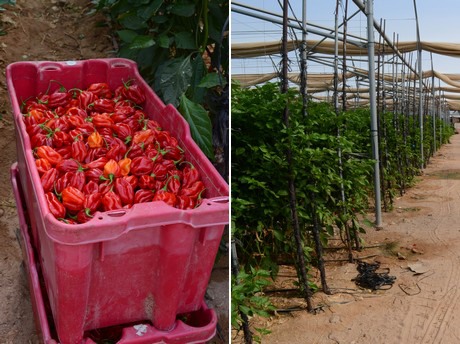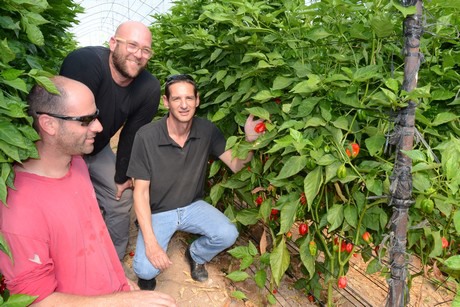The Israeli export company, Arava Export Growers, exports fresh Israeli produce worldwide. One of these is chilies. A couple of this company’s farmers have two hectares of their farm in the Arava Valley of habanero chili peppers growing in net houses.
“We have been growing various kinds of hot peppers for seven years now”, says one of the farmers. “For the last two years, we have only been growing habaneros. They sell well and have better quality.” The climate in the Arava Valley is conducive to almost disease-free peppers. “We have our problems”, says the other farmer. “Heat and soil salinity. Desalination of the soil is not cost-effective. We use a specific type of irrigation method to deal with the saltiness of the earth.”
The biggest problem is cracks in the skin of this vegetable. “Cracks are an issue, but the main issue is that people like to eat jalapeno pepper when it is green”, says the grower. “It takes ten to twelve days to transport this product. We harvest them green, but by the time they arrive at their destination, the color has started turning. So, there are a lot of rejects because of the color.”

Climate change
These two farmers have noticed a definite change in the climate. “ It is getting colder sooner every year. Summers are hotter, and winters are colder. Now, we also have massive rainstorms, which we did not have before. Last week, we had 30 mm of rain. That is usually the average for the entire year.”
“We have small quantities of two or three other varieties”, they say. “Every year we try to have something new. This year we have, for example, the California Reaper. If we get a customer who can guarantee that he will buy it, we plant more other varieties.”
The chilies are grown in the full ground. “The best time to set the pepper plants in when the nights are 12 degrees and the days, 24”, the farmers explain. “We will finish the setting in the first week of December. Hydroponics is an option, but it is expensive. Our plants do not need heat or artificial lighting.”
After the plants have been set, they are covered with plastic. The nets on the houses block some of the sun’s radiation. Although the farmers have a quota, they irrigate as much as they can. “We stop harvesting in mid-May/beginning of June. We remove the plants, opens sides of net houses, plow and till.”
“We then grow dates, mangos, and grapes until the chili season starts again. The main thing is that we are trying to diversify our crops”, they say.

Farmers face many challenges
Harvesting chilies is a very labor-intensive task. “It is not a problem getting workers,” says the growers. “It is, however, a problem to pay them.” They cannot compete with low labor costs in other countries. There is also pressure from other countries, like Morocco. “This increases every year.
It is not only labor costs and competition that affects these farmers. There is also politics. These Israeli farms are right on the border of Jordan. In fact, they have 100 ha of agricultural land in Jordan. They have leased this land from Jordan under the terms of the Peace Agreement set up in 1994.
This 25-year lease agreement is now almost up. “Now, they want the land back. The land used to belong to Israeli farmers before the Peace Treaty was put in place. The lease is really complex.” The Isreali farmers were allowed to work the fields in Jordan every day, but the land itself was considered to Jordanian territory.
For more information:
Ido Yaari
Arava
Mobile: +972-52-6286062
Tel: +972-3-9728139
Email: idoy@arv.co.il
www.arv.co.il
